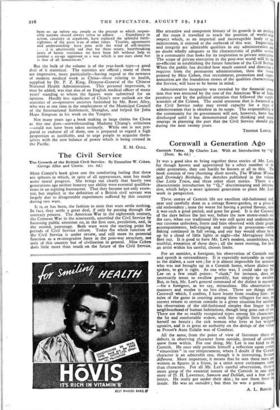Cornwall a Generation Ago Cornish Tales. By Charles Lee. With
an Introduction by " Q," (Dent. 8s. 6d.) IT was a good idea to bring together these stories of Mr. Leto for though known and appreciated by a select number of the older generation, they can hardly be known at all to this. The book consists of two charming short novels, The Widow Woman and Dorinda's Birthday, the sketches published in the volume Our Little Town, and three other short stories. There is characteristic introduction by " Q.," discriminating and informa- tive, which helps a more ignorant generation to place Mr. Lee's work in perspective.
These stories of Cornish life are excellent old-fashioned stuff, neat and carefully done as a cottage flower-garden, or a piece of old embroidery; the worse for having a period flavour, since it was such a gcod period, and gone for good. It is the Cornwall of the days before the last war, before the new motor-roads and the cars, when our traditional life was still quiet and undisturbed, our customs unbroken, feasts and fairs observed with their proper accompaniments, bell-ringing and couples in procession—when fishing continued in full swing, and our bay would often be lit up by a cloud of little lights at night—the Mevagissey fishing fleet out. It is good to have Mr. Lee's modest, unambitious, but truthful, evocation of those days ; all the more moving, for be an artist within his careful, chosen limits.
For an outsider, a foreigner, his observation of Cornish ways and speech is extraordinary. It is especially noticeable in regard to the dialect, a sure test ; for it is almost impossible for someone who was not brought up in a Cornish home, where dialect was spoken, to get it right. As one who was, I could take up Mt Lee on a few small points: " clunk," for instance, does not necessarily mean to swallow greedily, but simply to swallow. But, in fact, Mr. Lee's general command of the dialect is masterly —for a foreigner, as we say, miraculous. His observation and modes is no less close. There are things about Cornwall which, I confess, I have learnt from reading him: the rules of the game in courting among these villagers for one, the correct retorts to certain remarks in a given situation for another, his observation of the old-fashioned simples that linger in the neighbourhood of human habitations, though long gone out of use There are the so readily recognised types among his characters: the fat and comfortable widow, with her eligible little propert!, herself no beauty ; the sick woman who lives at her windol upstairs, and is as great an authority on the doings of the village as Proust's Aunt Eulalie was of Combrai.
All the same, from the point of view of literature there ate defects in observing character from outside, instead of creating anew from within. For one thing, Mr. Lee is too kind to tlx Cornish. He once only permits himself a reflection upon certain " sinuosities " in our temperament, where I doubt if the Cornish character is an admirable one, though it is interesting, because different. More important, it means that he sees these men and women as figures in a frieze, in a strict sense caricatures rathd than characters. For all Mr. Lee's careful observation, there 11 more grasp of the essential nature of the Cornish in one short story of D. H. Lawrence, Samson and Delilah, and a few of hil letters. He really got under their skin ; he saw them from the inside. He was an outsider ; but then he was a genius.
A. L. RowsE•


































 Previous page
Previous page